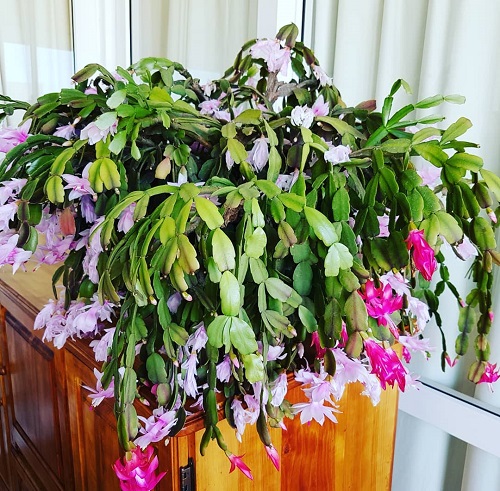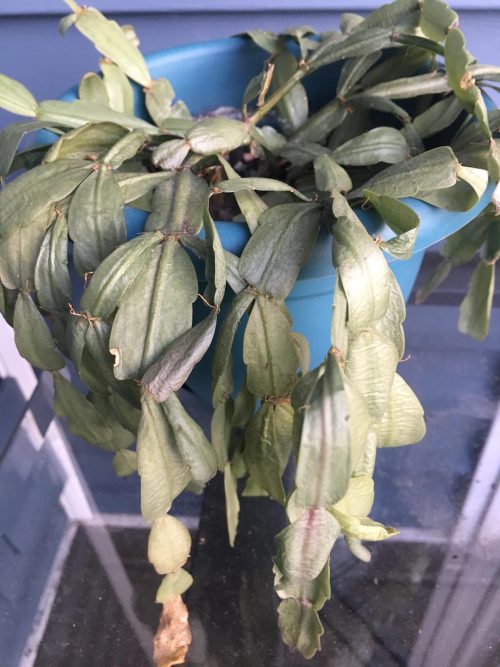Here are some of the most often ignored Common Christmas Cactus Growing Mistakes to Avoid for a thriving plant!
Growing a Christmas Cactus can bring a burst of color to your home during the holiday season – but ignorance can make this plant suffer in the long run. Here’s a list of the most Common Christmas Cactus Growing Mistakes to Avoid to maintain a flowerful plant that becomes the envy of your holiday guests!
Check out the best varieties of Christmas cactus here
Common Christmas Cactus Growing Mistakes to Avoid 🌵🎄
1. Overwatering: The Classic Blunder
Imagine treating your cactus like a thirsty camel. Spoiler alert: It doesn’t end well. Being a cactus, the last thing it loves on the planet is to be watered frequently, or on a daily basis.
The Fix: Let the soil dry out between waterings. Your cactus will thank you for it.
10 Best Types of Christmas Cactus Varieties
2. Poor Lighting: The Sunlight Fiasco
Too much sun and your cactus might start sunbathing; too little, and it’s a mess. Striking the right balance is the key to ensuring it thrives with those lovely flowers!
Balancing Act: Bright, indirect light is your friend. Keep it near an east-facing window for the best results.
3. Underwatering: The Dry Killer
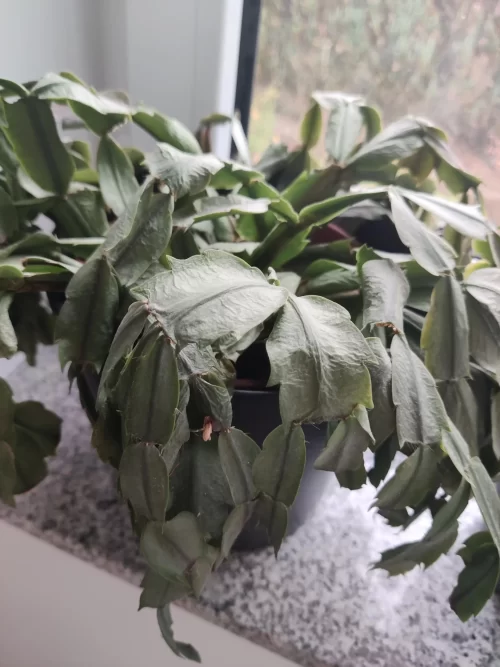
It’s a cactus, so it survives in the Sahara, right? Wrong! This isn’t your typical prickly desert dweller. Not watering it very frequently doesn’t mean you shouldn’t be watering it at all. After all, it’s a living plant that needs water to survive!
The Rescue Plan: Do not let the soil develop serious ‘dry cracks’ and become extremely brittle (Read – due to lack of water). A little dry topsoil is an indication that it needs watering.
Here’s everything about growing white Christmas Cactus
4. Wrong Soil Mix: A Big Mistake
Using dense, regular potting soil is a recipe to murder this plant. Do not scoop the soil from the garden, fill its pot, and expect it to bloom for years. It will be a big mistake!
Soil Solution: Opt for a well-draining mix. You can prepare an effective, budget-friendly homemade potting mix at home by mixing:
- Coarse Sand: 1 part
- Peat Moss or Coco Coir: 2 parts
- Perlite or Pumice: 1 part
- Worm Castings: 1/4 part
Or
- Peat Moss: 2 parts
- Perlite: 1 part
- Vermiculite: 1 part
5. Ignoring Humidity: Not Caring for the Moisture in the Air
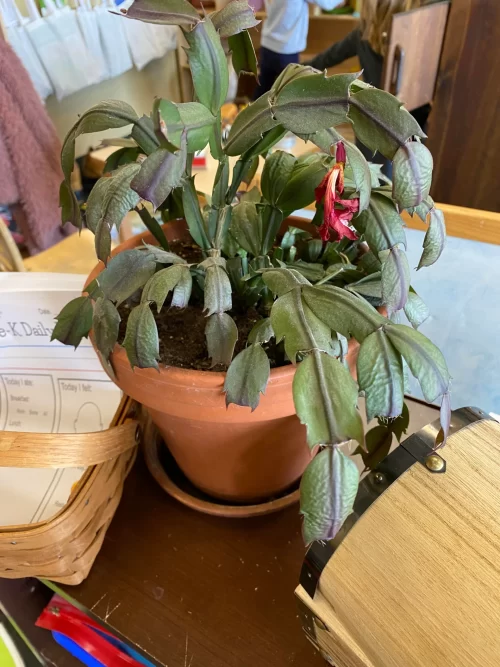
Christmas Cacti originate from the rainforests of Brazil. Unlike desert cacti, they are epiphytic, thriving on trees or rocks rather than in soil.
Their natural habitat provides clues to their care: moist conditions and air. Christmas Cacti require higher humidity, especially during flowering, for optimal growth and bloom.
The Humidifier Hack: Christmas cactus needs 50-60% humidity in the air to bloom. Use a humidifier to raise the moisture in the air. You can also make a DIY humidity tray on dry days by filling a saucer with pebbles and halfway water. The water will then evaporate, making the atmosphere humid. Make sure to place the pot above the waterline in the saucer.
Follow these tips to grow bushier Christmas cactus
6. Overlooking Pests: The Uninvited Guests
Bugs love crashing this cactus’ party. Mealybugs and spider mites are common culprits that can infest your Christmas cactus.
Pest Control Party Tricks: Regular check-ups and organic insecticides can show these party crashers the door. Choose an appropriate mild insecticidal soap or neem oil product that is effective against mealybugs and spider mites. These products suffocate and disrupt the pests’ ability to feed.
7. Neglecting to Re-pot: The Cramped Scenario
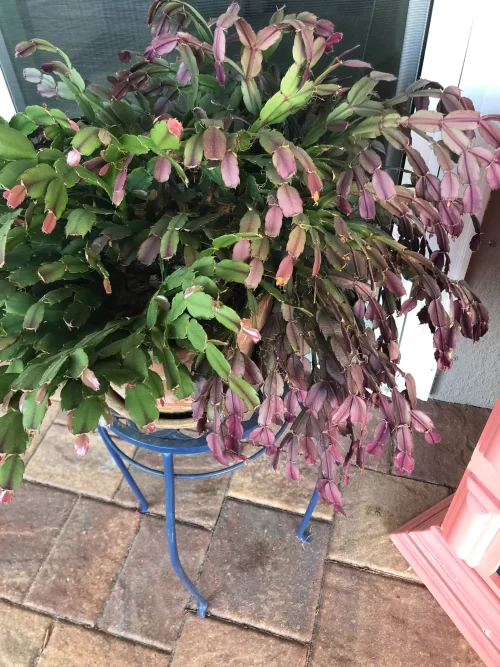
Imagine living in a studio apartment forever when all you want to do is enjoy a farm life. Well, your cactus will feel the same if it remains in the same pot for years.
The Roomier Upgrade: Re-pot it every three years or when the growth seems to have stopped, and it’s looking too pot-bound (Roots coming out of drainage hole or showing on the topsoil). The best time to re-pot is when it’s branching out new leaves in summer.
8. Forgetting to Fertilize: Keeping it Starved
If you want this plant to bloom in all its glory while being lush with the best leaves – feed it! Remember, how and when to do it is essential.
The Feeding Finesse: Feed your cactus with a balanced, water-soluble fertilizer like 20-20-20 or 20-10-20 in a weak dose (half or one-quarter of the recommended strength), once in 2-4 weeks during the growing period – usually from March to October (or up to November).
Note: Stop fertilizing the succulent once the plant stops growing, i.e., in winter.
Wondering when is the right time to keep a Christmas Cactus in the dark? Click here
9. Improper Pruning: Keeping it Messy
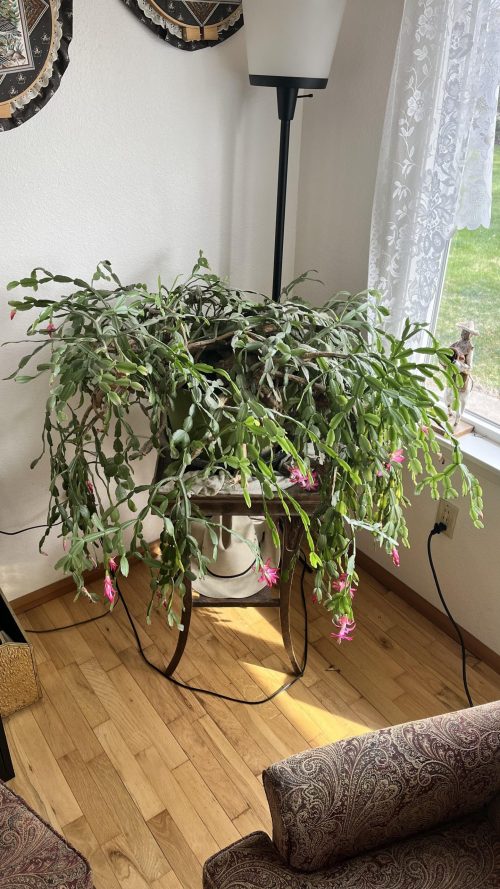
Over-pruning or doing it at the wrong time can turn your cactus into a mess. Remember, keeping it looking tidy, smart, and pruned will also keep it healthy.
Pruning Perfection: Trim your cactus after a month or two of the blooming season. At this time, the plant enters the growing phase and grows new leaves. Pinch out 1-2 segments to give it a bushy look. It will then branch out with new leaves, which will further bloom.
10. Wrong Temperature: Forgetting the Right Range
Fluctuating temperatures can stress your cactus – this will result in fewer or no flowers, which will take away all its charm.
Consistent Comfort: Keep your cactus away from areas prone to drafts, such as near windows, doors, or vents. These are common sources of abrupt temperature changes. Maintain a daytime temperature above 60°F (15°C) and ensure nighttime temperatures stay above 55°F (12°C).
Worried about the Christmas cactus turning purple? Find solution here
11. Using Hard Water: Not Keeping the Plant Spotless
Using hard water to moisten the growing medium and splashing some of it on the foliage is a sure shot way to attract diseases, and make the leaves full of white (Calcium) spots.
Use the ‘Right Water’: Always use RO, well, or rainwater. If you are using tap water, then allow it to sit overnight. Also, do not spill it on the leaves while watering the plant.
12. Forgetting the Darkness: Bad for Flowers
During the dark periods, the plant starts producing a hormone called florigen. It acts as the plant’s internal signal to initiate the development of buds and flowers.
Let the Darkness Surround the Plant: The ideal time to start the dark treatment for your Christmas cactus is mid-September to early October. This timing aligns with the plant’s natural blooming cycle, setting it up for a festive show during the holiday season. For more details, you can read our fantastic article here.

